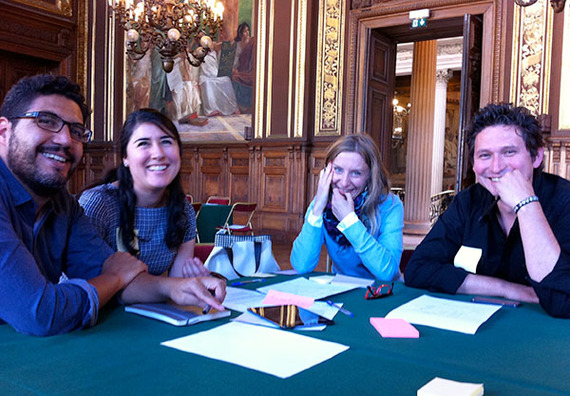The financial crisis of 2008 raised questions about the sustainability of our pursuit of growth for growth's sake alone. Many are now re-examining deeply rooted values, beliefs and attitudes toward our financial system, as well as how to organize, lead and manage our society. As the Creative Economy grows in importance, how might designers add value to the re-design of capitalism with their unique creative skills?
We decided to study how a conference venue might be used for concurrent design of concepts and design science research studies, by exploring these questions:
Are short and intense pressure workshops amenable to international conference settings and will attendees participate and appreciate the experience?
Utilizing designers whose expertise may lie outside the domain to be investigated, will the workshop sufficiently challenge the participants to generate innovative questions and novel insights?
Will workshop attendees return home with increased knowledge, experiences and insights that assist them to feel that their participation in the conference workshop was worthwhile?
At the 11th International European Academy of Design Conference Design-a-thon at the Sorbonne in Paris, France, designers were invited to explore how capitalism could be redesigned. Inspired by the possibilities offered at the intersection of Capitalism, Big Data and The Creative Economy. Eleven teams took on the massive change challenge of applying the Design Thinking process. In two short hours, they provided a quick stab at what a redesign might entail. Below are the areas they explored.
Capitalism operates under the assumption that "the invisible hand" optimizes income distribution and also that humans act rationally, however, both assumptions have long since been disproven. Design can aid in this regard, by shedding light on these still under utilized behavioral changes.
Big Data is the analysis and application of gigantic amounts of unstructured data (text, voice, images, film, etc.) continuously streamed by devices and sensors (Smart Phones, RFID, GPS, monitor and surveillance equipment.) Using Big Data, design can aid in establishing connections and formulate user-centered benefits.
Today, the US Economy has slowed to a 2% annual growth rate in GNP and consumer spending accounts for 65% of this growth. The Creative Economy represents 4% of the total economy, while intangibles alone (brand, goodwill, intellectual property, etc) represent 50 - 80% of a corporations' value - all the result of creative work.
The convergence of these three trends, make designers the ideal candidates of economic change. Below are some of the surprising insights from a macro level to micro level perspective of economics.
Crowdsourcing, as opposed to centralized decision-making, ensures better resource distribution for a more equal level of ecological sustainability. This inspired one team to propose turning current reality "upside down" by proposing that instead of having corporations and government monitoring citizens and managing them though the use of Big Data, Big Data could be made transparent and available to everyone to better inform individual decisions with no need for a shadowy invisible hand.
As our economy becomes increasingly intangible and digital, many tangible objects can be produced anywhere, even at home and with rapid prototyping equipment, the need for retail and wholesale will diminish. This led another team to propose a digital bartering system, allowing global redistribution of resources without intermediaries or, a more perfect market.
Healthy people are the foundation of a good economy and with an aging population people's attention is now focusing on their mental and physical health. With wearable sensors and personal devices measuring the quality of our air, water and food, life can now be managed in a more holistic fashion. This inspired one team to imagine a new collective food experience, where communal cooking and dining help to foster trust, health and a sense of community, or, a local community democracy at work.
Concurrent with the re-design of capitalism, we examined if periodically making teams aware of potential decision biases improved their outcomes. Half of the teams were asked to review ten decision biases after completing a step in the Design Thinking process, while the other half were not given this instruction.
Following the teams' presentation of their concept, the research team rated concepts on quality. The teams reviewing biases performed worse than those who did not, at a significant level of 10%. Though the sample size is small and the findings may not be statistically significant, the study suggests that ignoring bias in the initial concept phase can spur the generation of higher quality concepts overall.
New breakthrough ideas arise when people from different backgrounds come together with a common goal. It would seem that international conferences are an excellent venue for creating new ideas while also conducting design research studies. The pictures and movies gathered from this creative conference in Paris seem to indicate that the participating design researchers went home feeling uplifted and inspired.
Special thanks to Dr. Brigitte de Mozota, Dr. Gjoko Muratovski, Dr. Tore Kristensen and Finn Birger Lie for assisting with design research
